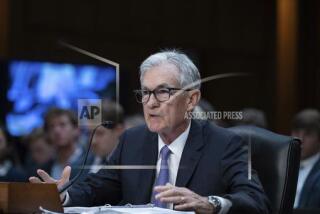Economic Growth Requires 3-Nation Effort--Volcker : Strong Steps Urged of U.S., Trading Partners
- Share via
WASHINGTON — Federal Reserve Chairman Paul A. Volcker asserted Thursday that sustained global economic growth requires strong steps by West Germany and Japan to stimulate their economies together with further U.S. efforts to reduce the federal budget deficit.
While Volcker acknowledged that efforts to stabilize international exchange rates should be given “a little more impetus” by a meeting this weekend of leading industrial nations, he warned that any currency market intervention by central banks “in no way substitutes for the more basic economic policy coordination or consistency.”
Volcker, issuing his semiannual report to the Senate Banking Committee on monetary policy, also sought to calm the nervous bond market by insisting that the Federal Reserve has not been quietly attempting to push up interest rates, as many investors had believed earlier this month when the central bank made no move to prevent an increase in short-term rates.
Other Side of Ledger
On the other side of the ledger, Volcker’s testimony suggested the Fed does not plan any cut in the key discount rate it charges for loans to financial institutions because of fears that lower U.S. interest rates would seriously undermine the value of the dollar.
“The big news in Volcker’s report is that there is no news,” said Mickey Levy, chief economist at Fidelity Bank in Philadelphia. “The Fed, for once, did not deliver a blockbuster for the markets. It’s steady as she goes.”
Volcker, in his testimony, vigorously defended the Fed’s disclosure that it was abandoning any effort to set a target for growth of the money supply. This measure of the nation’s money supply, known as M-1, which includes currency in circulation and checking accounts, rose by more than 15% last year, despite the Fed targets of 3% to 8% growth, and has recently been rising at a 21% annual rate.
In years past, fast growth in the money supply often has been a harbinger of inflation.
But Volcker said the past relationship between M-1 and the economy’s behavior has grown so erratic that the bank would do nothing more than monitor that money measure this year.
Economists overwhelmingly praised the Fed’s decision on M-1.
“All they are doing is confirming what in practice the Fed has been doing all along,” said Kathleen Cooper, chief economist at Security Pacific National Bank in Los Angeles. Nonetheless, Banking Committee Chairman William Proxmire (D-Wis.) rebuked Volcker for the move, arguing that ignoring rapid growth in the money supply now will force the Fed to crack down in the future, and “we’ll then have a recession that will curl your hair.”
When Volcker, who is nearly bald and is never without his trademark cheap cigar, responded with a pat to his head, Proxmire added: “O.K.--that will knock the ashes off your cigar.”
But analysts, while generally applauding the Fed’s careful balancing act to maintain economic growth in the face of recent years of increasing budget and trade deficits, also warned that its actions to boost the U.S. economy while the budget deficit remains high are likely to increase the chances that inflation will accelerate over the next few years.
“I think they are giving up the last vestiges of discipline,” said Jerry Jordan, chief economist of First Interstate Bank in Los Angeles and a former member of President Reagan’s Council of Economic Advisers.
“The dilemma facing the United States is that monetary policy is a very blunt instrument for dealing with the wide regional differences in economic performance,” he added.
Meanwhile, Treasury Secretary James A. Baker III, in a separate congressional hearing, publicly confirmed news reports of the weekend meeting of the so-called Group of Five industrial nations--Great Britain, West Germany, France, Japan and the United States.
However, he sought to downplay expectations of a major breakthrough on stabilizing currency rates by stating: “I want to knock down, hard, one published report that suggests it is an emergency meeting. It is not.”
The Reagan Administration, under increasing pressure from Congress to narrow last year’s record $170-billion trade deficit to avoid protectionist trade legislation, has been pushing other leading industrial nations to stimulate their economic growth to increase their demand for goods from the United States and debt-ridden Third World nations. Without such actions to help shrink the U.S. trade deficit, Treasury officials have warned, the dollar’s value would have to fall even lower to make U.S. products even cheaper on the international market.
More to Read
Inside the business of entertainment
The Wide Shot brings you news, analysis and insights on everything from streaming wars to production — and what it all means for the future.
You may occasionally receive promotional content from the Los Angeles Times.










